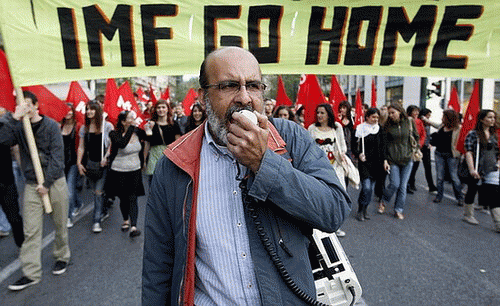A spectre is haunting Greece these days - the spectre of the International Monetary Fund. Premier George Papandreou has formally asked for the activation of an EU-IMF financial rescue package to help pull the debt-ridden economy out of its crisis. The hopes that just the promise of EU support, agreed last month, would be enough to reassure markets and help its recovery didn't come true. Apparently, Greece's problems have continued to hit investor confidence in the Euro and other European economies. Eurozone member-states will now provide tens of billions of euros in loans, based on ad-hoc governmental decisions.
The beginning of the negotiations between the Greek Ministry of Finance and the Troà �ka (EU, European Central Bank and the IMF) regarding the bailout mechanism of � ? �45bn have caused great concern in the country. The major fear of most Greeks is related with IMF's notorious demands towards fiscal austerity, job cuts, salaries and pensions' diminution. "Typhoon IMF for salaries, pensions and layoffs" says the Front Page of the daily 'To Vima' while the Labor Unions have called for 24hours strikes reacting to the prospective governmental measures on Economy.
The
idea of becoming Europe's Argentina frightens Greeks - this is not an
unjustified fear. The IMF's passing from the Latin American country - as well as
from Latvia and Hungary - was indeed a very negative experience for the
vast majority of their population. Most Greek media warn about the
strict austerity measures that the IMF puts on the table in order to
lend money to Athens for the following three years. The left-wing
'Avgi' daily refers to 22 "shock-measures" which the IMF brings
to Greece including, among others, mass layoffs in the public sector,
rises in pension ages, sweeping rounds of public sector's
privatizations, significant salaries cut and VAT increase.
"IMF GO HOME" says the banner during a rally against the government's decision to ask for an economic aid package in Athens, April 23, 2010. (Reuters)
Talking on
Alter Channel tonight, Labor and Social Insurance Minister Andreas
Loverdos said that the Greek government is under pressure in order to
adopt strict austerity policies. These
policies may help the government to reduce the country's high deficit
but cannot, in any case, guarantee that the long-term solvency
problems will be solved. But, actually, the issue seems to be broader.
Apart from the Greek case itself, the IMF's involvement in a member-state consists a failure of the EU's magniloquent economic
policies and plans. The
European Union should have already established its own European
Monetary Fund. The Greek crisis showed how dangerously unprepared
Europe is in times of emergency. Despite its verbal support
on the Greek government's measures, Brussels showed no ability to
protect the common currency
from international speculators. Greece's problem has hit confidence
in the single currency sparking fears it could spread to fellow
weaklings, Portugal, Spain or Italy, and therefore fuelling skepticism
regarding Euro's long-term survival.
The recent situation exposed major inefficiencies in the very heart of the Eurozone. The Greek government constrained to apply to the IMF because it couldn't have access to funds at normal interest rates and because Mrs. Merkel couldn't ask German voters to pay for a crisis they didn't create. On that point, the absence of a European Monetary Fund became more than evident.
The establishment of the EMF has one major aim: to create and manage fund assistance programs exclusively for the members of the Eurozone. Such a mechanism would eliminate the various speculations over the Euro, but it could also prevent member-states from bankruptcy. Prominent economists argue that, under specific parameters, the EMF would have accumulated about � ? �120 billion ($163 billion) over the past decade, enough to cover the likely costs of Greece. In close co-operation with the Eurostat, the EMF could set up a mechanism for regular financial surveillance within the Eurozone.
Those who oppose the establishment of a European Monetary Fund argue that member-states would lose their sovereignty over their finance policies. The intervention of the IMF in their economies, as it's going to happen in Greece, is a far more dolorous option. In the case of EMF a Eurozone member-state could have the choice to leave the common currency area under specific circumstances. In the end, the comeback of drachma seems to be less uncomfortable than the governance under the IMF's gruelling austerity policies.
The European Economic and Monetary Union failed to pass the exams on the Greek crisis. If it wants to protect the common currency, as well as its members, the EU has to reshape its policies and create new institutions. The EMF is a proposal which must not be ignored or underestimated.





